‘Randopat-Heritrails’ stands for ‘Randonnées du patrimoine – Heritage Trails’. It is a series of summer/winter schools organized by members of the Cultural Heritage Hub from different universities in turn. The principle behind the series is that of learning about our territories’ tangible and intangible cultural heritage by way of the experience of walking together and interacting with our environment. This first winter school of the series was entitled ‘Mushrooms, Herbs and Raw Food : Practices and Beliefs’. It focused on local and regional practices and beliefs associated with food production and preparation in connection with the natural environment in the Banat region. This has been the subject of an ongoing research project by a team of the Research Center for Heritage and Anthropology (RHeA), UVT, who could thus draw on their expertise and well-established local network to organize the winter school.
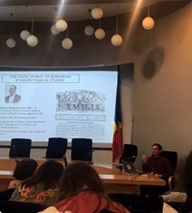 |
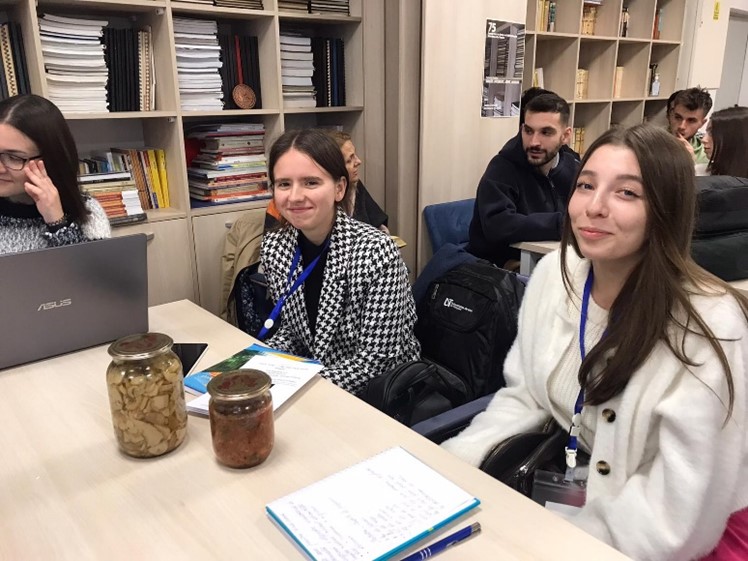 |
The first day, held at the university campus, was devoted to “setting the theoretical framework”. The event was opened by keynote speaker Dr. Madlen Șerban, Secretary-General of the Romanian National Commission for UNESCO. Dr. Șerban highlighted how this type of events and activities of UNITA Cultural Heritage Hub are perfectly inscribed within UNESCO’s policies regarding both Cultural Heritage and Education (as examples, she pointed at the Intergovernmental Committee for the Safeguarding of the Intangible Cultural Heritage, taking place at the end of November, and the Six Global Initiatives, launched at the Transforming Education Summit, held at the end of October).
Dr. Șerban’s introduction was followed by two presentations: ‘Gastronomy and Cultural Heritage’, by Dr. Cristina Maria Santos Estevão (Universidade da Beira Interior); ‘Humans and Herbs : The Perspective of Ethnobotanic Research’, by Dr. Cosmin Ivascu (ICAM, UVT). The afternoon was devoted to a panel session entitled ‘Building recipes – between food and shelter’, led by Dr. Alina Negru (TERRApia Timisoara), and to a roundtable, ‘Food recipes – between field research and public dissemination’, led by Prof. Otilia Hedesan (RHeA, UVT), with the participation of Prof. Felicia Vrinceanu and students from Chernivtsi University, Ukraine, which has recently become an associate partner of UNITA.
One of the important features of the Randopat-Heritrail series is, indeed, to give to students the chance of interacting and getting actively engaged, as opposed to passively listening to lectures by teaching staff. Thus, on Day 2, after a panel session on ‘Institutions involved in the management of Intangible Cultural Heritage’, led by Prof. Patricia Heiniger-Casteret and her co-tutelle PhD student Amandine Leporc (Université de Pau et du Pays de l’Adour), the remaining sessions consisted of short presentations given by students from all the 7 participating universities on their own work and academic interests. It was important to place these presentations right at the start of the event, so as to encourage discussions and exchanges during the rest of the week, on the many informal occasions that were offered to us to do so.
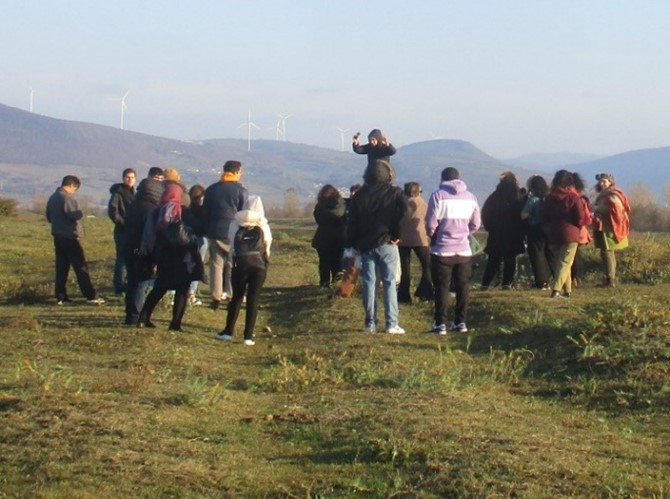 |
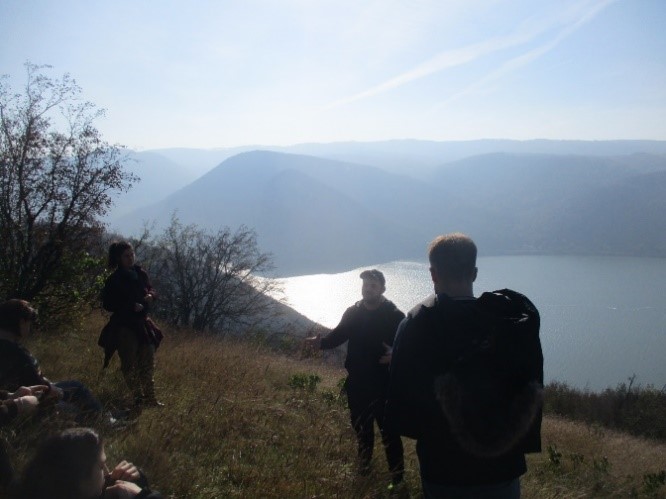 |
Day 3 and Day 4 were fieldwork days, in the area of Corononi, Caras-Severin County. The group was hosted by Maria and Cosmin, at their inn ‘Tarabostes’. During these two days, Maria and her team cooked for us delicious traditional meals, while Cosmin was our guide during the excursions.
The first excursion was a boat trip to an island formed on the Danube as a result of the 35 m rise in the water level due to the construction of the Iron Gates dam in 1972. This had a huge impact on the fauna and flora of the region, including herds of horses that were cut off from the river’s borders, thus continuing to live on and reproduce as the wild breed inhabiting the island nowadays. Also the life of people in the region was drastically altered, with approximately 17 000 people having to be relocated because of the flooding of their villages, and the ways of living of those remaining having to adapt, with respect to changing practices in the fishing of migratory species, for example, the routes of which were disrupted. All of this was discussed during our ‘randopat’ on the island. Upon our return to the inn, Prof. Hedesan and Dr. Mihut introduced the video interview of a lady who is a wealth of wisdom on foraging and uses of natural ingredients in the Caras-Severin region. A local fisherman was then interviewed in person, telling us all (or almost all!) on local fishing practices of various species, which were then cooked for us, with an explanation of the different recipes according to the area of the Danube and to the type of fish.
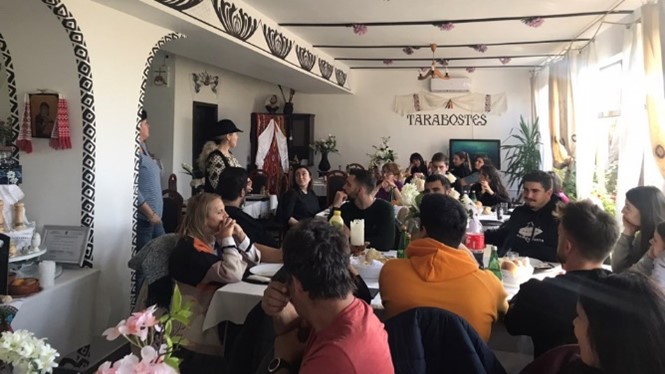 |
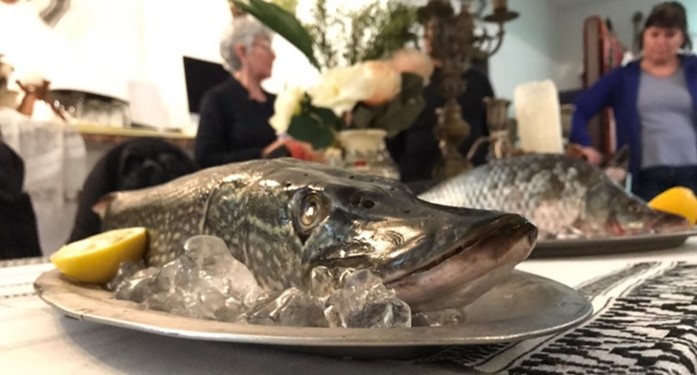 |
On our second ‘randopat’, the day after, we reached an extremely panoramic spot on the top of a hill, with a breath-taking view of the Danube. Here we engaged in an interesting discussion with Cosmin on the pros and cons of European legislations for pastoralism in the region.
We returned to Timişoara late at night, pretty tired, but very happy about all these extremely enriching experiences! On the following day, the morning was devoted both to the wrap-up of the winter school and to the kick-off of the two-day Cultural Heritage Hub’s workshop, during which members of staff from the various UNITA universities worked together to build a common research project to submit to EC programmes for funding such as Horizon. Students not only attended, but also contributed to the morning session, thus proving once more the benefit of working all together, thinking and acting outside predetermined boxes and categories, in a true, progressive European university.
This first Randopat created the nutshell of a UNITA community, which everybody is welcome to join, becoming a member of our Randopat WhatsApp Group. We want to keep in touch, exchanging information, tips and news on UNITA programmes and forthcoming events, and in particular, of course, on forthcoming randopats. There is already one that is being organized for spring/summer 2023, provisionally entitled ‘Sur les Chemins de Roland’: it will include two fieldwork days, with mountain hikes in the French and Spanish Pyrenees during which teaching staff will read out selected extracts on landscape from mediaeval texts in langues d'Oc and d’Oïl on a couple of mountain peaks with great views. So, join the Randopat WhatsApp Group and watch this space!
Giovanna Hendel
Cultural Heritage Hub Coordinator
“È stata una settimana intensa, ricca tanto in termini di contenuti e nozioni appresi, quanto di emozioni, piacevolissima socialità e tanto, tanto buon cibo tipico condiviso!
Mi segno assolutamente la prossima data e attendo con ansia la nuova randopat sulla Chanson de Roland, che già suona super interessante!”
Sara Ferracane, Bachelor student, Università degli Studi di Torino
“Que semana fantástica. Em nome do IPG e da ESTH, foi um privilégio para nós fazer parte deste grupo, e desfrutar de uma semana cheia de novas aprendizagens, cultura, experiências, mas principalmente de partilha. Amamos Timisoara, uma excelente organização que permitiu que tudo corresse na perfeição. Parabéns, UVT e boa sorte. #timisoaraforever
Os nossos alunos já estão a perguntar quando será a próxima Randopat, de facto, estamos todos ansiosos pela próxima!”
Rui Pedro Pinheira Cerveira, Professor at the Escola Superior de Turismo e Hotelaria, Instituto Politécnico da Guarda
“Le BIP Randopat organisé par L'Université de l'Ouest Timisoara fut, selon moi, une grande réussite.
Ce programme a su mêler des apports théoriques grâce à des conférences sur le patrimoine culturel immatériel en lien avec la gastronomie locale, des expériences de terrain par le partage des moments de convivialité avec les personnes du pays, mais aussi a suscité entre nous, chercheurs.ses et étudiant.e.s européens des échanges forts enrichissants. Nous avons communiqué sur nos pratiques, nos perceptions et sensibilités sur le patrimoine culturel immatériel. L’exposé des travaux de recherche, les témoignages des personnes qui nous ont accueilli.e.s ont étoffé mes connaissances
et étayé ma réflexion sur les enjeux actuels le concernant.Le programme nous a permis également de découvrir d'autres horizons, de se confronter aux acteurs directs du patrimoine, de s'interroger mais aussi de s'émerveiller par la diversité inhérente à cette discipline et qui en fait un champ de recherche complexe mais ô combien passionnant.
Merci pour cette expérience avant tout humaine mais aussi riche d'un point de vue du savoir.”
Marie Domengès, Doctoral student at the Université de Pau et du Pays de l’Adour (co-tutelle UNITA with Università degli Studi di Torino)
“Це був дуже насичений тиждень. Ми мали можливість поділитися своїм досвідом щодо збереження та популяризації культурної спадщини, а також брали участь у численних заходах, спрямованих на навчання навичків дослідження ресурсів спадщини." Бружа Філотєя студентка бакалавра Чернівецького національного університету імені Юрія Федьковича.”
“A fost o săptămână extraordinară. Am avut ocazia să împărtășim experiențele noastre în conservarea și promovarea patrimoniului cultural și am participat la numeroase activități care au contribuit la formarea abilităților de cercetare a resurselor de patrimoniu.”
Paduraru Anastasia studentă de licență la Universitatea Națională Yuri Fedkovich Cernăuți
“Sono stata molto colpita dall’efficienza e dalla cura con la quale è stato considerato ogni particolare dell’organizzazione di questo evento, complesso e ricco di attività interessanti. L’accoglienza è stata calorosa, generosa e attenta alle esigenze di tutti i partecipanti, la disponibilità e la professionalità delle colleghe della Uni de Vest din Timisoara, degli ospiti e delle guide è stata eccellente e il lato gastronomico superlativo! Mi è sembrata anche molto ben calibrata l’alternanza tra attività pratiche e seminari, tutti di altissimo profilo. In definitiva è stata un’ottima occasione non solamente per far collaborare i membri di UNITA, ma anche per conoscere alcuni lati forse più nascosti di un bel paese e della sua cultura!”
Giulia Ferdeghini, Research Fellow, Università degli Studi di Torino
“Existem experiências que não se esquecem e a partilha do conhecimento, o dinamismo e os laços criados fizeram deste evento, um exemplo disso. A empatia criada entre os participantes aliada ao enorme profissionalismo, sentido de compromisso e simpatia por parte da organização foram aspetos fundamentais para o sucesso desta Escola Temática. As visitas in loco a lugares, com forte herança cultural, da região foram uma excelente mais-valia.
Somos UNITA!”
Cristina Maria Santos Estevão, Professor at the Universidade da Beira Interior